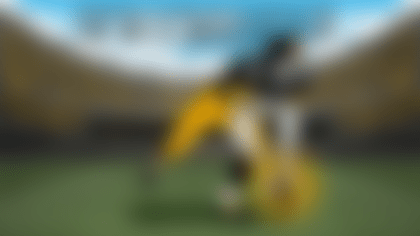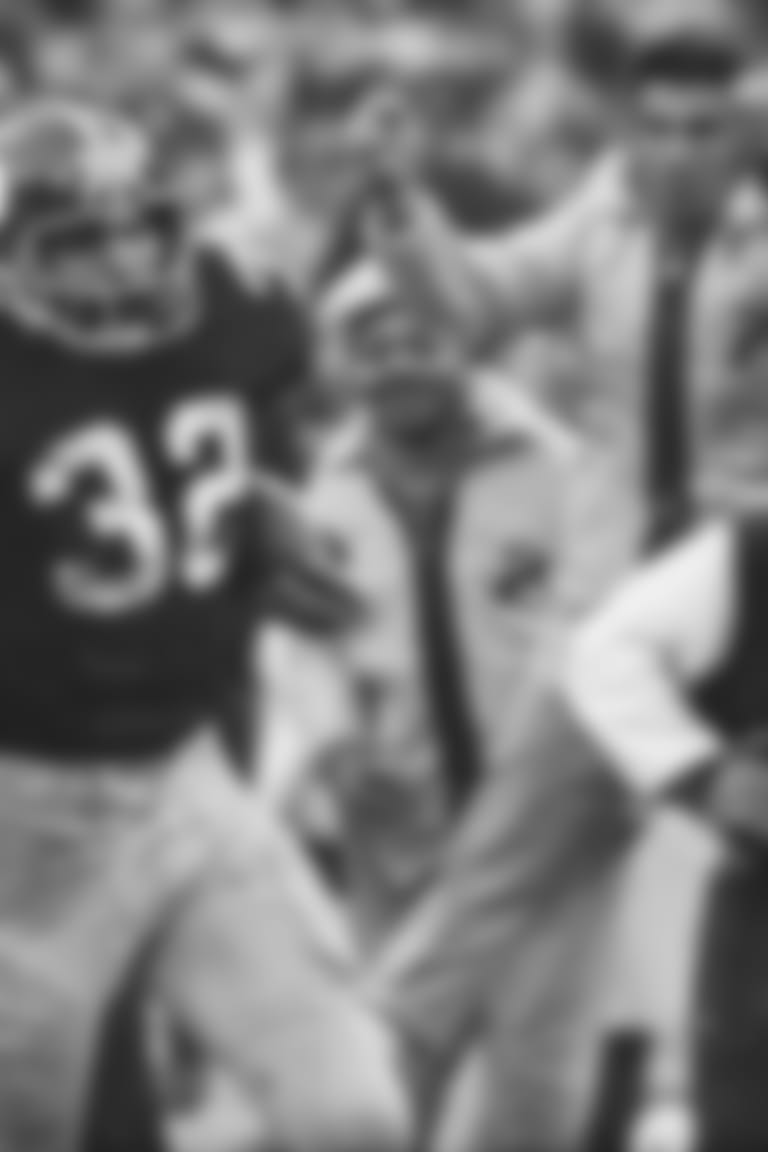The debate over the Immaculate Reception rages on decades after it happened, but no one's contesting the play's standing in 撸先生AV history.
By Judy Battista | Published Dec. 20, 2019
NOTE FROM THE AUTHOR (DEC. 21, 2022): When this story was first reported three years ago, what stood out then -- and what resonates still -- is how much of 撸先生AV history turned on that one miraculous play, and how so many of those involved, even members of the Raiders, reveled in the retelling. Unlikely friendships were forged, deeply personal memories were made and one of football's greatest dynasties sprang from the Immaculate Reception.
Franco Harris, the play's hero, died at age 72, days before his number was to be retired by the Steelers (his will be just the third retired in franchise history) as part of the 50th anniversary celebration of his most famous play, which will coincide with a game between the Raiders and Steelers on Saturday night. To the end, Harris was an adored figure in Pittsburgh, where he was deeply involved in the community. Just before Harris' passing, Steelers coach Mike Tomlin spoke reverently about Harris, about his impact on the Steelers, but also about Harris the man. The franchise and the 撸先生AV were lucky to have him, for many more reasons than just that one play.
But what a play it was. Here is the story, on the advent of its 50th anniversary, of the greatest play in 撸先生AV history.
The play was 66 Option, or maybe 66 Circle Post, the details lost to time and endless retellings. The idea never changed, though. Franco Harris, the Pittsburgh Steelers rookie fullback, was to stay in and block along with the tight end, similar to max protection, while the halfback, Frenchy Fuqua, was to run a seam route and try to occupy the opposing safety. If that safety bit, quarterback Terry Bradshaw would try to hit his first read, rookie receiver Barry Pearson.
In the sterile environment of a game plan, this was the perfect play for the occasion, and blocking would be especially important. It was fourth-and-10 from the Steelers' 40-yard line with just 22 seconds left in a divisional playoff game at home. And the Steelers had just lost the lead in a defensive slugfest when the nimble Oakland Raiders quarterback Kenny Stabler scrambled 30 yards for the go-ahead touchdown with little more than a minute remaining. The Steelers needed this play to go as it was drawn up to get close enough to attempt a game-winning field goal and end the franchise's long history of futility.
It did not go as it was drawn up.
Instead, it was marvelous mayhem, a broken play for the ages that gave the Steelers a 13-7 win on Dec. 23, 1972, a play that demands repeat viewings and additional explanations. All those future Hall of Famers -- both head coaches that day are in Canton, too -- collided in a play that still defies definition, creating a bitter rivalry, launching one of football's most dominant dynasties, and maybe introducing officiating's use of instant replay. Forty-seven years later, nobody -- from the players who lived it to a physics professor scrutinizing film -- has been able to say for sure exactly what happened on the field. The low-definition television footage only adds to the fuzziness. But one thing is crystal clear: The Immaculate Reception is the greatest play in the 撸先生AV's 100 years.
The 1972 season had already been something of a miracle in Pittsburgh. Before it had even begun, Bradshaw had told his father that there were four teams on the schedule that were sure-fire playoff teams, and if the Steelers could beat just two of those, they would gain confidence they could play with anybody. They beat all four and went 11-3 to make the playoffs for just the second time in their 39-year history. Long before their six Lombardi Trophies and legendary stability, the Steelers were lovable but bumbling losers. Even a coaching luminary like Chuck Noll needed four seasons to turn around a franchise that had 13 head coaches before he was plucked from Don Shula's Baltimore Colts staff in 1969. But in 1972, everything clicked. The Steel Curtain dropped on opponents. Harris rushed for more than 1,000 yards and was the Offensive Rookie of the Year. Franco's Italian Army sprang to life.
Harris was young and naive, and as soon as the Steelers made the playoffs, he was dreaming of the Super Bowl. The history of the team, and the late Stabler scramble, foretold something else as the Steelers prepared for one final chance to extend their season.
"The Steelers always found a way to lose," Harris said. "I remember telling myself, 'Franco, this will probably be the last play of the year. It was a good year so play it through the end.' That's what I told myself going into the huddle."
Art Rooney, the white-haired, cigar-chewing Steelers founder, left his box and got into the elevator, heading down to the locker room to greet and console his team, as he'd done so many times before. The Steelers had mustered just two field goals on the day, and all of Pittsburgh had been conditioned to expect the worst. In Mount Holly, N.J., Harris' family was watching on television. His mom, Gina, was from Italy and did not understand football, so she was in the kitchen, not paying attention to the game. Suddenly, Gina sensed something was wrong. She went to her old record stack, took out her Italian album and, on the Saturday two days before Christmas, she played some music. Ave Maria.
As he broke the huddle at that moment, Bradshaw told his teammates, "We got to get it."
Raiders safety Jack Tatum was thinking something else. He had already broken up Bradshaw's first- and third-down pass attempts on that drive and he wanted one more. With the Raiders in man-to-man coverage for this fateful play, his assignment was tight end John McMakin. Harris' responsibility was even simpler: Stay in the backfield and block.
"Last chance for the Steelers," said Curt Gowdy, calling the game for NBC.
Bradshaw took the snap and the protection broke down almost immediately. He scrambled to his right, ducking under the Raiders' Tony Cline, backpedaling all the way to the Steelers' 28-yard line.
"I got flushed out to the right, cut off from getting to the outside," Bradshaw said. "I looked downfield, saw a black jersey and just fired it."
Fuqua came out of the backfield, thinking he was going to be a star.
"Everything was working perfect," Fuqua said. "I got open, as I took my eyes from the center to the ball, I caught a quick glance of Tatum coming at me. I said, 'Oh no, I need Bradshaw to throw this to my inside shoulder.' He threw the ball to a point. I'm running full speed. I see Jack Tatum coming full speed."
What happened next is anybody's guess.
"While he was scrambling, I said to myself, 'Be an outlet pass just in case,' " Harris said. "He threw the ball downfield and automatically in my head came Joe Paterno's voice of Go to the ball. That's what he always told us in college, but in college I never listened."
Fuqua: "I'm thinking one thing is for sure, if I don't catch it, nobody will catch it. If he hits me early, it's pass interference and we get another shot. I could hear him breathing. I'm glad I didn't slow down because he would have surely gotten the interception."
The ball arrived at the Raiders' 35-yard line at the same moment as Tatum and Fuqua, and it is there that the legend takes off. Fuqua leaped and reached for the ball, but Tatum, who had come running from at least 10 yards away, crushed him with his right shoulder, sending Fuqua backwards at least 3 yards. He looked up and briefly caught a glimpse of Tatum standing over him, smiling. The ball ricocheted backward and the central mystery of the play -- of 撸先生AV history, really -- is whether the ball hit Tatum or Fuqua to send it flying 7 yards. If it hit Fuqua, the play, by the rules of the day, should have been over. If it hit Tatum, the play was live. One more question: Did the ball graze the frozen field before Harris, hunched over, grasped it with his fingertips and took off down the left sideline?
"I remember nothing," Harris said. "My mind is completely blank. The only thing I remember is stiff-arming Jimmy Warren right at the end before going into the end zone. In my mind, I'm thinking, get into the end zone. Then it was just bedlam."
On the ground, Bradshaw heard the roar of the crowd and thought to himself, "You are a hero to millions. You put that sucker right there on the money. I'm going to be on the cover of a Wheaties box. I might make 15 or 20 grand this offseason."
Bradshaw did not find out until he got to the sideline, where the Steelers were embracing and the Raiders were dumbfounded and furious, that it was Harris -- possibly aided by the split-second delay before Raiders defenders gave chase -- who had taken the carom and galloped to glory. Apparent glory, according to the Raiders.
"There were three infractions on that one play," explains George Atkinson, the Raiders safety who saw the play develop in front of him. "I saw the ball hit Fuqua and I saw the tip of the ball touch the ground. Two offensive players couldn't touch the play. Then Franco picked if off the ground -- that was the second infraction. And then Phil Villapiano got clipped on that play."
Said Villapiano: "The tight end dove right at the back of my legs. To this day, I think about that. If I had fallen, maybe I would have gotten the call. If he hadn't hit me, I would have caught Franco."
The back judge had raised his arms to signal the touchdown, but the other members of the crew did not. They huddled. John Madden ran onto the field and was quickly told by officials to get off, because they didn't know what had happened. Minutes passed and confusion descended. Referee Fred Swearingen went to the Steelers sideline and asked for a telephone. He was taken into a baseball dugout at then-new Three Rivers Stadium, which the Steelers shared with the Pittsburgh Pirates. A call was placed to the press box, where, conveniently, the 撸先生AV's supervisor of officials, Art McNally, was observing the game. Legend has it that the phone was answered either by Steelers public relations director Joe Gordon or by Dan Rooney, Art Rooney's son and the man who had hired Noll.
McNally told the New York Daily News in 1997 he had an opinion from the very beginning, that the ball had hit Tatum. He took one look at an instant replay on a monitor but while he watched the officials huddling, he wondered if they were talking about the possibility of the touchdown not counting. Swearingen got on the phone and told McNally that two of the officials said the ball had hit Tatum, and two others thought it had hit both Tatum and Fuqua. McNally told the Daily News: "So I said, 'Everything is fine, go ahead and go.' "
Ten minutes after the play, Swearingen came out of the dugout, went to midfield and raised his arms to signal a touchdown. The Steelers exulted in happy disbelief. The Raiders were dumbfounded.
"The guy comes out and puts his hands up and it was ... WHAT?" Villapiano said.
Madden, during a broadcast on the 30th anniversary of the play, called it a big old lump of coal. He is not so much angry with the call, but in the way it was made.
"My whole point all these years was if you knew it was a touchdown, then call it a touchdown," Madden told the Daily News on the 25th anniversary. "If you didn't know it was a touchdown, then how the hell did you find out?"
In the locker room, Madden was more succinct with his players.
"He just said, 'We got f-----,' " Villapiano remembers. "And something like we'll never get to the bottom of it."
On the way into their locker room, the Steelers were, in fact, greeted by Art Rooney, who had heard the roar when Harris scored while in the elevator. He had, as Harris thinks about it now, gotten on the elevator a loser and gotten off a winner, the fortunes of his franchise swinging in the time it took to go down a few floors.
Fuqua had a question as he shook the owner's hand.
"Mr. Rooney, should I tell them what happened?" Fuqua asked. "There were reporters all around the locker room. He had a cigar in his mouth. 'Frenchy, keep it to yourself.' "
"The number of reporters asking did you touch it? I love publicity. If I answer it, what will be in the papers tomorrow? I said to myself, we won the game, and that's the most important thing."
"I'll never tell," Fuqua said.
Up in the stands around the 40-yard line, Jim Baker had been with his nephew for the fateful play. Baker and his wife had brought their newborn son home from the hospital the day before, but Baker's brother-in-law had offered him tickets so Baker had left his wife, Mary, at home with the newborn and their older son.
Baker is just 5 feet, 5 inches tall, so he didn't see whether Harris caught the ball cleanly. But he saw the run and he kept watching very closely. Baker, who is now a retired insurance executive in western Pennsylvania, remembers seeing Harris throw the ball down after he scored. It rolled and an equipment manager picked it up.
Baker was running down the stadium steps with his 14-year-old nephew, Bobby Pavichak. There were just a few seconds left and they wanted to be down on the field to celebrate. Still, he kept watching. And he told his nephew not to take his eyes off the football, which was now being readied for the extra point attempt.
"They shoved us back," Baker remembers. "They didn't put nets up back then. We had already moved behind the goalpost. It hit the stadium wall and bounced back onto the field."
Forty years later, a man called Baker to tell him that he had first had the ball in his hands -- he still had the scar on his lip from when his glasses were smashed into his face in the scrum to retrieve the ball.
Baker, then a 26-year-old former high school wrestler, emerged with it.
"I tucked the ball and grabbed my nephew's hand and said, let's run out of here," Baker recalled. "I was afraid some Steelers and the police would come after me." On the way home, he stopped to visit a friend, a huge Steelers fan and a wealthy businessman. He offered him $1,000 on the spot for the ball.
"I said, 'No.' I had a newborn son at home. I'm going to take it and dedicate it to him and his other brother," Baker said. "A few days later everybody was coming to see the football, not the newborn."
The story does not end there, of course. It was really just beginning. A few hours after the game ended, Pittsburgh's legendary broadcaster Myron Cope, who would later essentially invent the Terrible Towel, was at the television station where he worked, preparing for his commentary. A woman called and, mindful of the holiday season, suggested Cope name the play the Immaculate Reception. Cope hesitated for a moment -- would that be disrespectful to the Catholic Church? -- but he loved it too much to resist. A divine name for a heavenly play.













